Kathleen Jones's Blog, page 25
December 14, 2015
Tuesday Poem: Margaret Atwood, Red Fox
The red fox crosses the ice
intent on none of my business.
It's winter and slim pickings.
I stand in the bushy cemetery,
pretending to watch birds,
but really watching the fox
who could care less.
She pauses on the sheer glare
of the pond. She knows I'm there,
sniffs me in the wind at her shoulder.
If I had a gun or dog
or a raw heart, she'd smell it.
She didn't get this smart for nothing.
She's a lean vixen: I can see
the ribs, the sly
trickster's eyes, filled with longing
and desperation, the skinny
feet, adept at lies.
Why encourage the notion
of virtuous poverty?
It's only an excuse
for zero charity.
Hunger corrupts, and absolute hunger
corrupts absolutely,
or almost. Of course there are mothers,
squeezing their breasts
dry, pawning their bodies,
shedding teeth for their children,
or that's our fond belief.
But remember - Hansel
and Gretel were dumped in the forest
because their parents were starving.
Sauve qui peut. To survive
we'd all turn thief
and rascal, or so says the fox,
with her coat of an elegant scoundrel,
her white knife of a smile,
who knows just where she's going:
to steal something
that doesn't belong to her -
some chicken, or one more chance,
or other life.
© Margaret Atwood
from ' Morning in the Burned House '
Houghton Mifflin
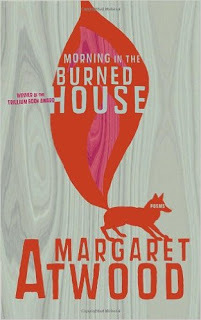
This poem seems very appropriate just at the moment, and probably Margaret Atwood thought so too as she's just posted it up on her Facebook page. I've always been a bit ambivalent about Margaret Atwood's poems - some I love and some I don't. I've often found her wordy and a bit abstract. But this collection is anything but. This is Margaret Atwood at her most political, writing with a very sharp point indeed. I have quite a few favourites in Morning in the Burned House. One is February : - "February, month of despair,/ with a skewered heart in the centre,". The poem is centred around her cat, who behaves just as cats do; "In the pewter mornings, the cat . . . settles/ on my chest, breathing his breath/ of burped-up meat and musty sofas,/ purring like a washboard." But the cat becomes a metaphor for something else, just as the red fox does in this poem.
Also in this collection is In the Secular Night , which perfectly describes those early morning moments, what I call the Terrible 3 ams, though Margaret Atwood's seem to be half an hour earlier. "In the secular night you wander around/ alone in your house. It's two-thirty./ Everyone has deserted you", and your whole life revolves around your brain as you wander the silent rooms.
But by a long distance Red Fox is my favourite poem. It's about so many things when you start peeling away the layers. And I love the images, particularly 'her white knife of a smile'. I can see the fox as she writes.
Morning in the Burned House
Margaret Atwood
Houghton Mifflin, 1996.
The Tuesday Poets are taking a break from posting on the hub site - sheer exhaustion and the workload of our members - but individual Tuesday Poets will still be posting on their own blogs and the links on the hub site will still be there. Today is the last of our official Hub poems and it's a collective effort edited by NZ poets Mary McCallum and Claire Beynon. Please click the link to read 'I know now what I didn't know then' by all of us.
Published on December 14, 2015 15:30
December 13, 2015
A Watery Saga or The Miller's Tale
A week ago we were under water. It began on Friday afternoon - a blustery, sunny day, but we had been mildly flooded the night before. Over night on Thursday the river had come bounding over its banks, after ten days of storms, and lapped over the cobbled driveway outside the mill, making every expedition beyond the house a welly boot job. Minor roads were wheel-arch deep in water and almost every river and beck full.
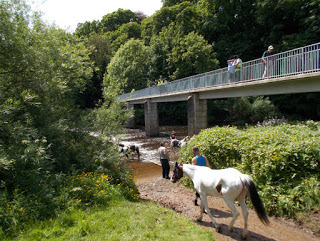 The footbridge outside the Mill on a normal day.We were still drying out from that when, on the Friday evening weather forecast, they flagged up the imminent arrival of Storm Desmond, a tightly wrapped torpedo of a weather system with a long tail like a comet stretching out across the Atlantic. The main eye of the storm would miss us, the forecaster said, but the rain and wind trailing behind would give us an uncomfortable 24 hours. They weren't sure of the exact trajectory, but it was going to rain - a lot. More than a 100mm was mentioned. We often get forecasts like this in the Lake District, but weather is so local here, a few miles can make everything different. However, there was something about the look of Dastardly Desmond that said he was not to be underestimated.
The footbridge outside the Mill on a normal day.We were still drying out from that when, on the Friday evening weather forecast, they flagged up the imminent arrival of Storm Desmond, a tightly wrapped torpedo of a weather system with a long tail like a comet stretching out across the Atlantic. The main eye of the storm would miss us, the forecaster said, but the rain and wind trailing behind would give us an uncomfortable 24 hours. They weren't sure of the exact trajectory, but it was going to rain - a lot. More than a 100mm was mentioned. We often get forecasts like this in the Lake District, but weather is so local here, a few miles can make everything different. However, there was something about the look of Dastardly Desmond that said he was not to be underestimated.
It started to rain as it got dark, not particularly intense, but steady and purposeful. By midnight the river was a surging brown torrent, level with its banks and beginning to explore the margins. I went to bed and tried to sleep, but the wind was buffeting the windows and driving squalls of rain like gravel against the glass. There were bumps and bangs outside. At 2.30am I gave up the struggle. The river was rising much more quickly than usual - it was now over the banks, over my garden and lapping the steps outside the building. The Mill is built on a plinth above the river bank to keep its feet out of the water. There are six steps up to the front door - about 4 or 5 feet. We measure the rise by how quickly each step disappears. It was still raining heavily. By dawn the view from our front door looked like this: -
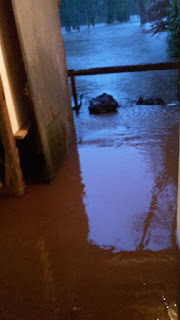 Dawn - the water has already reached the ground floor and pouring through. The TV weatherman was warning of at least another 12 hours of intense rain still to come and at that point I knew it was going to come into the building in a serious way. I've lived here for 25 years and been flooded 3 times before, so have a fairly good idea of the way the river behaves. I knew we were in trouble. Once the river comes up, every hour of heavy rain is another step under water. So 12 hours is the steps outside and about 4 feet of water through the ground floor. By 4.30am it was another 2 feet deeper and I rang the Local Floodline and heard a recorded message telling me that flooding was inevitable, there was a danger to life and property, to collect my valuables and move out.
Dawn - the water has already reached the ground floor and pouring through. The TV weatherman was warning of at least another 12 hours of intense rain still to come and at that point I knew it was going to come into the building in a serious way. I've lived here for 25 years and been flooded 3 times before, so have a fairly good idea of the way the river behaves. I knew we were in trouble. Once the river comes up, every hour of heavy rain is another step under water. So 12 hours is the steps outside and about 4 feet of water through the ground floor. By 4.30am it was another 2 feet deeper and I rang the Local Floodline and heard a recorded message telling me that flooding was inevitable, there was a danger to life and property, to collect my valuables and move out.
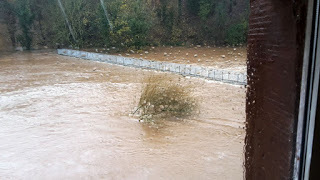 The footbridge lunchtime on SaturdayI rang Neil in Italy as soon as I thought decent and told him to get on a plane - this wasn't going to be an ordinary event, but something catastrophic. They were now talking about 24 hours of rain. The comet's tail was loaded with moisture and intent on dropping it all on already sodden Cumbria. Then I woke my young lodgers in the granny flat and warned them not to flush the toilets and make everything safe. Fortunately their rooms are above any previous flood levels. They very kindly came down to the ground floor and began helping me to move some of the heavier items like washing machines up to Neil's workshop on the mezzanine level. They also offered to help evacuate our lodger on the ground floor, but he wasn't at home so there was nothing we could do. Then they went off to stay with their parents. Good friends and neighbours arrived to help me take off the main doors of the Mill so that they wouldn't be swept out with the flood water. It does less damage if the water can just flow straight though. There was too much water outside now to allow us to board up the windows. On my own, without the help of friends, much more would have been lost.
The footbridge lunchtime on SaturdayI rang Neil in Italy as soon as I thought decent and told him to get on a plane - this wasn't going to be an ordinary event, but something catastrophic. They were now talking about 24 hours of rain. The comet's tail was loaded with moisture and intent on dropping it all on already sodden Cumbria. Then I woke my young lodgers in the granny flat and warned them not to flush the toilets and make everything safe. Fortunately their rooms are above any previous flood levels. They very kindly came down to the ground floor and began helping me to move some of the heavier items like washing machines up to Neil's workshop on the mezzanine level. They also offered to help evacuate our lodger on the ground floor, but he wasn't at home so there was nothing we could do. Then they went off to stay with their parents. Good friends and neighbours arrived to help me take off the main doors of the Mill so that they wouldn't be swept out with the flood water. It does less damage if the water can just flow straight though. There was too much water outside now to allow us to board up the windows. On my own, without the help of friends, much more would have been lost.
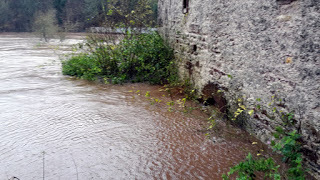 Almost up to the top of the ground floor windows, Saturday morningWhile we were working there was a surge in the river, which suddenly hurled itself across the ground floor like the Grand Rapids. The water, which had only been ankle deep, was now at the top of our wellies . I heard one of the windows smash. It wasn't safe to be in there any more.
Almost up to the top of the ground floor windows, Saturday morningWhile we were working there was a surge in the river, which suddenly hurled itself across the ground floor like the Grand Rapids. The water, which had only been ankle deep, was now at the top of our wellies . I heard one of the windows smash. It wasn't safe to be in there any more.
There is nothing anyone can do at this point. We put off the electricity at the mains so it wouldn't short out once the water reached the switches. And then we started moving everything up one more level. Even the mezzanine floor, which has never flooded in the whole history of the mill, was no longer safe. Fortunately, because of the flood risk, our main living accommodation is on the upper floor, but the forecast rain was so extreme, there was no telling whether that would escape. There's also the worry about structural damage. The Mill, like a bridge, is built out into the river and takes the full brunt of the river's power once it floods. What is in summer a beautiful view, turns into a potential killer.
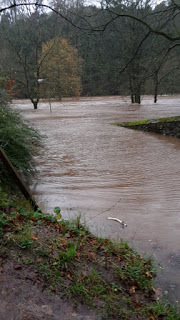 Rear entrance about to be cut offI stayed as long as I could. I didn't want to leave the building, but by now it was thrumming like a drum with the pressure of the water on the outside walls and the sound of the river going through underneath the floor was terrifying. By late evening it was a foot deep on the mezzanine floor and in uncharted territory. For the first time I really saw the point of Twitter. Everyone was sharing information about which roads were passable, where flood help was available, and even identifying people who needed rescuing. My small home town was inundated and other towns, downstream, in the Lake District were beginning to flood. So many roads were underwater, it was now impossible to go anywhere in the county. Neil had managed to get as far as Preston in Lancashire but was stranded because there were no transport services running and all roads were closed. Cumbria was completely cut off.
Rear entrance about to be cut offI stayed as long as I could. I didn't want to leave the building, but by now it was thrumming like a drum with the pressure of the water on the outside walls and the sound of the river going through underneath the floor was terrifying. By late evening it was a foot deep on the mezzanine floor and in uncharted territory. For the first time I really saw the point of Twitter. Everyone was sharing information about which roads were passable, where flood help was available, and even identifying people who needed rescuing. My small home town was inundated and other towns, downstream, in the Lake District were beginning to flood. So many roads were underwater, it was now impossible to go anywhere in the county. Neil had managed to get as far as Preston in Lancashire but was stranded because there were no transport services running and all roads were closed. Cumbria was completely cut off.
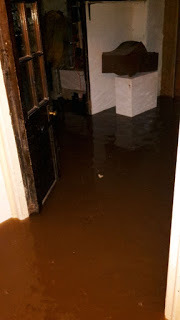 6 inches deep on the Mezzanine level and still raining 9pm.I moved all our valuables, photographs and other precious things, into the part of the Mill that is built into the cliff, hoping that if the floors further out gave way, that part would still be intact. Then I climbed out of the top floor into my neighbour's garden (with their permission) and went to stay with our wonderful friends. Not that it was a comfortable night - like many, many people in Cumbria I didn't know what I would find went I went back home. Things were obviously never going to be the same again.
6 inches deep on the Mezzanine level and still raining 9pm.I moved all our valuables, photographs and other precious things, into the part of the Mill that is built into the cliff, hoping that if the floors further out gave way, that part would still be intact. Then I climbed out of the top floor into my neighbour's garden (with their permission) and went to stay with our wonderful friends. Not that it was a comfortable night - like many, many people in Cumbria I didn't know what I would find went I went back home. Things were obviously never going to be the same again.
To be continued . . . .
 The footbridge outside the Mill on a normal day.We were still drying out from that when, on the Friday evening weather forecast, they flagged up the imminent arrival of Storm Desmond, a tightly wrapped torpedo of a weather system with a long tail like a comet stretching out across the Atlantic. The main eye of the storm would miss us, the forecaster said, but the rain and wind trailing behind would give us an uncomfortable 24 hours. They weren't sure of the exact trajectory, but it was going to rain - a lot. More than a 100mm was mentioned. We often get forecasts like this in the Lake District, but weather is so local here, a few miles can make everything different. However, there was something about the look of Dastardly Desmond that said he was not to be underestimated.
The footbridge outside the Mill on a normal day.We were still drying out from that when, on the Friday evening weather forecast, they flagged up the imminent arrival of Storm Desmond, a tightly wrapped torpedo of a weather system with a long tail like a comet stretching out across the Atlantic. The main eye of the storm would miss us, the forecaster said, but the rain and wind trailing behind would give us an uncomfortable 24 hours. They weren't sure of the exact trajectory, but it was going to rain - a lot. More than a 100mm was mentioned. We often get forecasts like this in the Lake District, but weather is so local here, a few miles can make everything different. However, there was something about the look of Dastardly Desmond that said he was not to be underestimated.It started to rain as it got dark, not particularly intense, but steady and purposeful. By midnight the river was a surging brown torrent, level with its banks and beginning to explore the margins. I went to bed and tried to sleep, but the wind was buffeting the windows and driving squalls of rain like gravel against the glass. There were bumps and bangs outside. At 2.30am I gave up the struggle. The river was rising much more quickly than usual - it was now over the banks, over my garden and lapping the steps outside the building. The Mill is built on a plinth above the river bank to keep its feet out of the water. There are six steps up to the front door - about 4 or 5 feet. We measure the rise by how quickly each step disappears. It was still raining heavily. By dawn the view from our front door looked like this: -
 Dawn - the water has already reached the ground floor and pouring through. The TV weatherman was warning of at least another 12 hours of intense rain still to come and at that point I knew it was going to come into the building in a serious way. I've lived here for 25 years and been flooded 3 times before, so have a fairly good idea of the way the river behaves. I knew we were in trouble. Once the river comes up, every hour of heavy rain is another step under water. So 12 hours is the steps outside and about 4 feet of water through the ground floor. By 4.30am it was another 2 feet deeper and I rang the Local Floodline and heard a recorded message telling me that flooding was inevitable, there was a danger to life and property, to collect my valuables and move out.
Dawn - the water has already reached the ground floor and pouring through. The TV weatherman was warning of at least another 12 hours of intense rain still to come and at that point I knew it was going to come into the building in a serious way. I've lived here for 25 years and been flooded 3 times before, so have a fairly good idea of the way the river behaves. I knew we were in trouble. Once the river comes up, every hour of heavy rain is another step under water. So 12 hours is the steps outside and about 4 feet of water through the ground floor. By 4.30am it was another 2 feet deeper and I rang the Local Floodline and heard a recorded message telling me that flooding was inevitable, there was a danger to life and property, to collect my valuables and move out. The footbridge lunchtime on SaturdayI rang Neil in Italy as soon as I thought decent and told him to get on a plane - this wasn't going to be an ordinary event, but something catastrophic. They were now talking about 24 hours of rain. The comet's tail was loaded with moisture and intent on dropping it all on already sodden Cumbria. Then I woke my young lodgers in the granny flat and warned them not to flush the toilets and make everything safe. Fortunately their rooms are above any previous flood levels. They very kindly came down to the ground floor and began helping me to move some of the heavier items like washing machines up to Neil's workshop on the mezzanine level. They also offered to help evacuate our lodger on the ground floor, but he wasn't at home so there was nothing we could do. Then they went off to stay with their parents. Good friends and neighbours arrived to help me take off the main doors of the Mill so that they wouldn't be swept out with the flood water. It does less damage if the water can just flow straight though. There was too much water outside now to allow us to board up the windows. On my own, without the help of friends, much more would have been lost.
The footbridge lunchtime on SaturdayI rang Neil in Italy as soon as I thought decent and told him to get on a plane - this wasn't going to be an ordinary event, but something catastrophic. They were now talking about 24 hours of rain. The comet's tail was loaded with moisture and intent on dropping it all on already sodden Cumbria. Then I woke my young lodgers in the granny flat and warned them not to flush the toilets and make everything safe. Fortunately their rooms are above any previous flood levels. They very kindly came down to the ground floor and began helping me to move some of the heavier items like washing machines up to Neil's workshop on the mezzanine level. They also offered to help evacuate our lodger on the ground floor, but he wasn't at home so there was nothing we could do. Then they went off to stay with their parents. Good friends and neighbours arrived to help me take off the main doors of the Mill so that they wouldn't be swept out with the flood water. It does less damage if the water can just flow straight though. There was too much water outside now to allow us to board up the windows. On my own, without the help of friends, much more would have been lost. Almost up to the top of the ground floor windows, Saturday morningWhile we were working there was a surge in the river, which suddenly hurled itself across the ground floor like the Grand Rapids. The water, which had only been ankle deep, was now at the top of our wellies . I heard one of the windows smash. It wasn't safe to be in there any more.
Almost up to the top of the ground floor windows, Saturday morningWhile we were working there was a surge in the river, which suddenly hurled itself across the ground floor like the Grand Rapids. The water, which had only been ankle deep, was now at the top of our wellies . I heard one of the windows smash. It wasn't safe to be in there any more.There is nothing anyone can do at this point. We put off the electricity at the mains so it wouldn't short out once the water reached the switches. And then we started moving everything up one more level. Even the mezzanine floor, which has never flooded in the whole history of the mill, was no longer safe. Fortunately, because of the flood risk, our main living accommodation is on the upper floor, but the forecast rain was so extreme, there was no telling whether that would escape. There's also the worry about structural damage. The Mill, like a bridge, is built out into the river and takes the full brunt of the river's power once it floods. What is in summer a beautiful view, turns into a potential killer.
 Rear entrance about to be cut offI stayed as long as I could. I didn't want to leave the building, but by now it was thrumming like a drum with the pressure of the water on the outside walls and the sound of the river going through underneath the floor was terrifying. By late evening it was a foot deep on the mezzanine floor and in uncharted territory. For the first time I really saw the point of Twitter. Everyone was sharing information about which roads were passable, where flood help was available, and even identifying people who needed rescuing. My small home town was inundated and other towns, downstream, in the Lake District were beginning to flood. So many roads were underwater, it was now impossible to go anywhere in the county. Neil had managed to get as far as Preston in Lancashire but was stranded because there were no transport services running and all roads were closed. Cumbria was completely cut off.
Rear entrance about to be cut offI stayed as long as I could. I didn't want to leave the building, but by now it was thrumming like a drum with the pressure of the water on the outside walls and the sound of the river going through underneath the floor was terrifying. By late evening it was a foot deep on the mezzanine floor and in uncharted territory. For the first time I really saw the point of Twitter. Everyone was sharing information about which roads were passable, where flood help was available, and even identifying people who needed rescuing. My small home town was inundated and other towns, downstream, in the Lake District were beginning to flood. So many roads were underwater, it was now impossible to go anywhere in the county. Neil had managed to get as far as Preston in Lancashire but was stranded because there were no transport services running and all roads were closed. Cumbria was completely cut off. 6 inches deep on the Mezzanine level and still raining 9pm.I moved all our valuables, photographs and other precious things, into the part of the Mill that is built into the cliff, hoping that if the floors further out gave way, that part would still be intact. Then I climbed out of the top floor into my neighbour's garden (with their permission) and went to stay with our wonderful friends. Not that it was a comfortable night - like many, many people in Cumbria I didn't know what I would find went I went back home. Things were obviously never going to be the same again.
6 inches deep on the Mezzanine level and still raining 9pm.I moved all our valuables, photographs and other precious things, into the part of the Mill that is built into the cliff, hoping that if the floors further out gave way, that part would still be intact. Then I climbed out of the top floor into my neighbour's garden (with their permission) and went to stay with our wonderful friends. Not that it was a comfortable night - like many, many people in Cumbria I didn't know what I would find went I went back home. Things were obviously never going to be the same again. To be continued . . . .
Published on December 13, 2015 14:13
December 8, 2015
Tuesday Poem: River Rising - for a flooded Appleby
From the window
the weir's constant conversation
has vanished -
levelled
by a brown silence.
We watch the water push
its way around the mill house
dangerous and unexpected.
Measure its rise
step over step
towards the door.
We rescue carpets
stack sandbags. Decide
what we most value.
Gently it laps across
the flagstones, casually
exploring cupboards, cellars
boot-deep. Then -
a thud, a surge; the force
that drove the mill wheels powers
through windows and doors.
From the safe stairs' island
we fish floating furniture
with a broom. All our geography
is different - now we are
part of the river's narrative.
It rushes through rooms,
every window's view;
everything is river.
Beyond the gaping doors
a street lamp blooms
yellow in a brown sea.
© Kathleen Jones
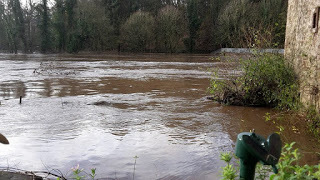 My garden and first floor windows are under the water. River 20 feet above normal level.This poem was written for an earlier, much more benign, event. The flood we have just experienced topped anything previously recorded. 341 mm of rain in 24 hours produced a raging torrent that swept away roads and bridges, stopped rail services and inundated houses and businesses. Our ground floor was flooded several feet deep and it encroached a foot deep onto the upper mezzanine floor. Windows have been smashed and there is mud and debris everywhere. We are lucky in that we still have a dry bed to climb into. But it has been terrifying and, because we can't get flood insurance, will be very expensive. My thoughts go out to everyone who is homeless and struggling to cope.
My garden and first floor windows are under the water. River 20 feet above normal level.This poem was written for an earlier, much more benign, event. The flood we have just experienced topped anything previously recorded. 341 mm of rain in 24 hours produced a raging torrent that swept away roads and bridges, stopped rail services and inundated houses and businesses. Our ground floor was flooded several feet deep and it encroached a foot deep onto the upper mezzanine floor. Windows have been smashed and there is mud and debris everywhere. We are lucky in that we still have a dry bed to climb into. But it has been terrifying and, because we can't get flood insurance, will be very expensive. My thoughts go out to everyone who is homeless and struggling to cope.
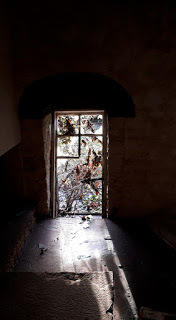 Ground floor window after the river goes down.
Ground floor window after the river goes down.
Published on December 08, 2015 06:59
December 3, 2015
How to turn politics into art - Ai Wei Wei
All around the world writers and artists are struggling with censorship in harsh political regimes. How so many of them manage to achieve creative work in these conditions always fills me with admiration. The Chinese artist Ai Wei Wei is one of these.
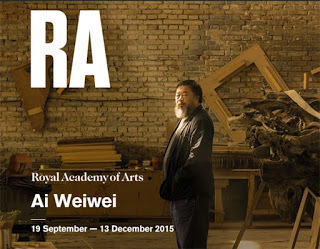
While I was in London for the Climate Change COP21 march, I managed to get into the Royal Academy to see his exhibition there. They're opening until midnight at weekends - I had an evening ticket and the RA was packed. I didn't know what to expect - some political work is more about the subject than the form - but I was knocked out by this exhibition from the moment I walked into the courtyard and into his forest of trees, bolted together from pieces of wood collected in the mountains of China. There is both spiritual and political significance behind these objects.
The curator of the exhibition comments that:
'When I was in Beijing for my first meeting with Ai Weiwei I went, as most people do, to visit the Forbidden City. I was astonished to see people taking photographs of themselves next to a dead tree in the Imperial Garden at the far north of the complex, adjacent to the Hall of Imperial Peace. In China, trees are venerated as important counterparts to the dead on earth, the realm between heaven and the underworld. This particular long-dead tree clearly held particular significance, perhaps as an indicator of the venerable age of the temple, linking the past to the present. When I saw this, it made me immediately think of Ai’s Tree series that he started in 2009.'
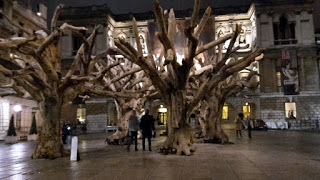
Ai Wei Wei's materials may be political, but it is almost always the form that is the most important thing about his work. The basic material of sculpture is often dictated by what artists can easily obtain, and the first things in the exhibition are objects made from domestic furniture. But in the first big room there's a wonderful section from AWW's relief map of China, 'Bed' made from pieces of ironwood salvaged from the thousands of Buddhist temples demolished across the country by Chairman Mao. Both the ripple effect and the cross-section profile are fascinating.
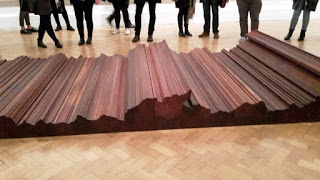
Ai Wei Wei's father was a poet who was banished by Mao, with his family, to a work camp for 're-education'. He spent twenty years there and that is the context of AWW's upbringing. Not surprising that he grew up with a burning political conscience. Corruption - both political and commercial - is one of his targets. In the massive earthquake of 2008 in Sichuan, many of the dead were school children and students, because building regulations (particularly steel reinforcing) had not been met in public buildings due to corrupt officials and companies. Ai Wei Wei salvaged steel reinforcing rods from the schools and colleges - one for each student killed - hammered them out and used them to make a sculpture called 'Straight'. It is a river of metal - different from every viewing point.
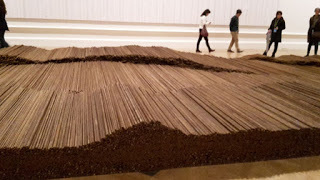
The students' names are exhibited on the wall beside it.
Chinese authorities have not approved Ai Wei Wei's work any more than their predecessors approved his father's. He has been arrested, imprisoned, held under house arrest, forbidden to leave the country, accused of tax evasion, despite his increasing world wide fame. But this has not stopped him. When his studio was bulldozed by the government, he used the rubble to create a sculpture. This was one I really liked.
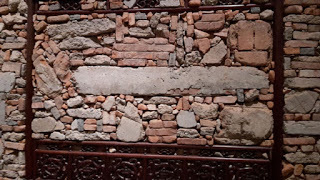
He was forbidden to talk about his time in prison, so instead he created 'boxes', dioramas with an aperture that you can peer into, and inside is a room with sculpted figures showing some of the things that happened to him. I was fascinated by the fact that the furniture in his cell was wrapped in plastic padding to prevent it being used as a weapon or as an object of self-harm. The walls of the cell are padded, presumably for the same reason.
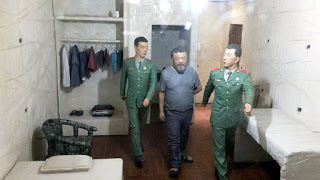
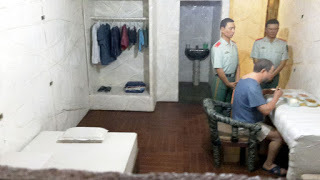
I also loved his painted ceramic pots, arranged in a colourful group. Though even here, politics plays a part. Why, he asks, should old ceramics from a previous age be more valuable than the work of potters creating new pots now?
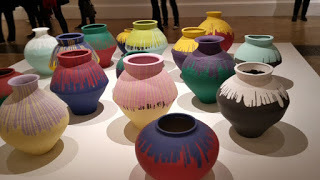
Other 'fun' sculptures play with perspective, like this resin cube
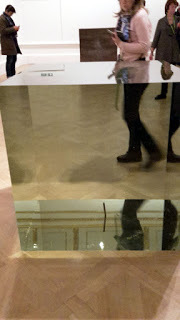
and I liked these Chinese puzzles.
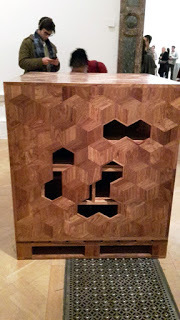
But the centre piece, hung under the huge glass dome of the RA, is his chandelier made out of bicycle wheels and frames. Bicycles are very sculptural objects and Ai Wei Wei has welded them together and strung them with crystal and lights to create something very beautiful.
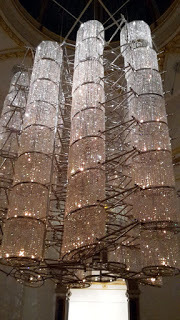

While I was in London for the Climate Change COP21 march, I managed to get into the Royal Academy to see his exhibition there. They're opening until midnight at weekends - I had an evening ticket and the RA was packed. I didn't know what to expect - some political work is more about the subject than the form - but I was knocked out by this exhibition from the moment I walked into the courtyard and into his forest of trees, bolted together from pieces of wood collected in the mountains of China. There is both spiritual and political significance behind these objects.
The curator of the exhibition comments that:
'When I was in Beijing for my first meeting with Ai Weiwei I went, as most people do, to visit the Forbidden City. I was astonished to see people taking photographs of themselves next to a dead tree in the Imperial Garden at the far north of the complex, adjacent to the Hall of Imperial Peace. In China, trees are venerated as important counterparts to the dead on earth, the realm between heaven and the underworld. This particular long-dead tree clearly held particular significance, perhaps as an indicator of the venerable age of the temple, linking the past to the present. When I saw this, it made me immediately think of Ai’s Tree series that he started in 2009.'

Ai Wei Wei's materials may be political, but it is almost always the form that is the most important thing about his work. The basic material of sculpture is often dictated by what artists can easily obtain, and the first things in the exhibition are objects made from domestic furniture. But in the first big room there's a wonderful section from AWW's relief map of China, 'Bed' made from pieces of ironwood salvaged from the thousands of Buddhist temples demolished across the country by Chairman Mao. Both the ripple effect and the cross-section profile are fascinating.

Ai Wei Wei's father was a poet who was banished by Mao, with his family, to a work camp for 're-education'. He spent twenty years there and that is the context of AWW's upbringing. Not surprising that he grew up with a burning political conscience. Corruption - both political and commercial - is one of his targets. In the massive earthquake of 2008 in Sichuan, many of the dead were school children and students, because building regulations (particularly steel reinforcing) had not been met in public buildings due to corrupt officials and companies. Ai Wei Wei salvaged steel reinforcing rods from the schools and colleges - one for each student killed - hammered them out and used them to make a sculpture called 'Straight'. It is a river of metal - different from every viewing point.

The students' names are exhibited on the wall beside it.
Chinese authorities have not approved Ai Wei Wei's work any more than their predecessors approved his father's. He has been arrested, imprisoned, held under house arrest, forbidden to leave the country, accused of tax evasion, despite his increasing world wide fame. But this has not stopped him. When his studio was bulldozed by the government, he used the rubble to create a sculpture. This was one I really liked.

He was forbidden to talk about his time in prison, so instead he created 'boxes', dioramas with an aperture that you can peer into, and inside is a room with sculpted figures showing some of the things that happened to him. I was fascinated by the fact that the furniture in his cell was wrapped in plastic padding to prevent it being used as a weapon or as an object of self-harm. The walls of the cell are padded, presumably for the same reason.


I also loved his painted ceramic pots, arranged in a colourful group. Though even here, politics plays a part. Why, he asks, should old ceramics from a previous age be more valuable than the work of potters creating new pots now?

Other 'fun' sculptures play with perspective, like this resin cube

and I liked these Chinese puzzles.

But the centre piece, hung under the huge glass dome of the RA, is his chandelier made out of bicycle wheels and frames. Bicycles are very sculptural objects and Ai Wei Wei has welded them together and strung them with crystal and lights to create something very beautiful.

Published on December 03, 2015 07:22
November 30, 2015
Bears Not Bombs - and other stories
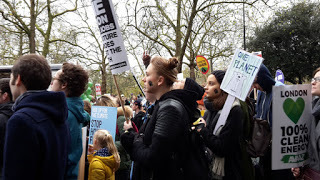 London Climate Change MarchIt was wild and it was wet, but that was the weather! No anarchy or water bombs. One of the biggest demonstrations London has seen, but all went off in an orderly and good-natured way in spite of the storm. I was marching with Greenpeace and had instructions to assemble at Hyde Park Corner before joining the main march on Park Lane.
London Climate Change MarchIt was wild and it was wet, but that was the weather! No anarchy or water bombs. One of the biggest demonstrations London has seen, but all went off in an orderly and good-natured way in spite of the storm. I was marching with Greenpeace and had instructions to assemble at Hyde Park Corner before joining the main march on Park Lane. 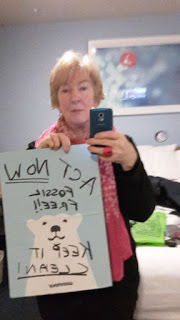 Ready for the DemoEveryone had made an effort to be as colourful as possible and there were some very imaginative placards with good slogans including 'Make Love, Not Co2', 'Bears Not Bombs' as well as all the usual environmental quips. There was a lot of fantastic artwork to put my scribbled poster to shame. 'Disgusted of Tonbridge' put in an appearance too.
Ready for the DemoEveryone had made an effort to be as colourful as possible and there were some very imaginative placards with good slogans including 'Make Love, Not Co2', 'Bears Not Bombs' as well as all the usual environmental quips. There was a lot of fantastic artwork to put my scribbled poster to shame. 'Disgusted of Tonbridge' put in an appearance too. 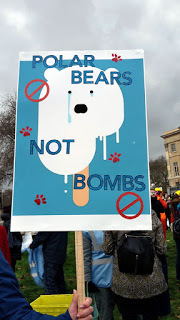
The atmosphere was like a carnival and, with more than fifty thousand people swarming into the park, it felt electric. There were polar bear processions
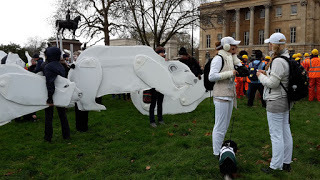
And even people dressed as Polar Bears.
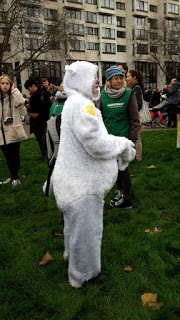
A few zebras put in an appearance too. Anything was possible.
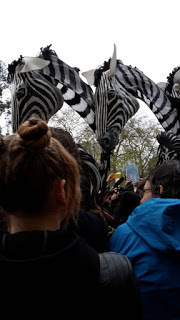
I was lucky enough to be close to the old Fire Brigade Union engine they were using as a platform and able to listen to the speakers. Vivienne Westwood was electrifying (and terrifying!) accusing politicians of being criminals. A Bangladeshi woman talked about the increasing salination of the land in her home country and how people are finding it hard to grow food. Flooding is more frequent and in areas where communication is a problem the women have set up a network to warn each other so that their homes can be evacuated as the water rises. The President of the Royal College of Nurses talked about the strain that climate change will put on the health service. But the star of the show was Jeremy Corbyn who in real life is a wonderful speaker and talks a lot of sense in a very authoritative way. Climate Change, both now and in the future, is the greatest threat to international security and human well-being.
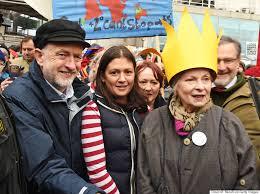 Corbyn and WestwoodWhen I see Labour MPs on TV spitefully accusing him of being a 'rubbish' leader I now wonder who they are describing. The roar of tens of thousands of voices yelling approval should reassure them that he is doing the job he was elected to do.
Corbyn and WestwoodWhen I see Labour MPs on TV spitefully accusing him of being a 'rubbish' leader I now wonder who they are describing. The roar of tens of thousands of voices yelling approval should reassure them that he is doing the job he was elected to do. 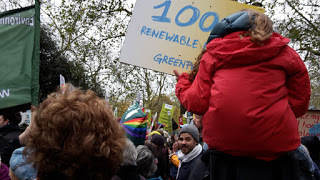
The diversity of the crowd was amazing. There were representatives of local councils from all over Britain, trade unions, the Royal College of Nursing, a lot of doctors, as well as environmental groups such as Save the Trees, Woodland Trust, Friends of the Earth, Avaaz, 38 Degrees, Christians, Muslims, Buddhists, Druids, Ban Bombs, Ban Fracking, MPs of every political persuasion, but, tellingly, NOT A SINGLE CONSERVATIVE. You might have expected that someone from the department of the environment might have come along to explain their intentions in Paris? Especially as they claim on their website . . . "We are the UK government department responsible for safeguarding our natural environment, supporting our world . . . Our broad remit means we play a major role in people's day-to-day life, from the food we eat, and the air we breathe, to the water we drink." Their absence doesn't bode well for Paris.
There were also quite a few French people in the crowd, unable to protest in Paris. Others were marching for French friends, with their names taped to their jackets. In Paris thousands of shoes were arranged in the Place de la Republique to represent the people who wanted to march, but were forbidden to do so. It is one of the most moving images I've seen.
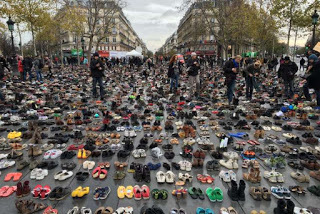
It took me hours and hours to get home because the storms had blown trees across the railway tracks and brought down power lines. Virgin Trains finally sent me to my destination with a small group of other travellers in a mini-bus. It was a fantastic day, and there was also the feeling that one was doing something - even if only being one small voice in a huge crowd - but also the comfort of feeling part of a movement. As Caroline Lucas said in her speech, 'To change everything, you need everyone'.
Published on November 30, 2015 14:55
November 27, 2015
Marching for Climate Change awareness
On Sunday I'm going to be in London for the Greenpeace 'March of the Polar Bears'. Not so much Save the Arctic this time, more Save the World. The March is part of a coordinated campaign in major cities all over the planet to make politicians aware of the gravity of the situation before the Climate Summit in Paris which begins next week.
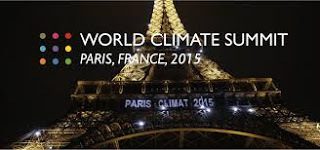
I'm doing this because I'm increasingly concerned that the issue of climate change is going to be overshadowed by the Syrian crisis and discussion of whether or not we should bomb the hell out of various middle eastern locations. The climate issue is of the utmost importance - being the catalyst for conflict all over the world and the biggest threat to our national security. Most of the so-called 'economic migrants' from African countries are leaving because they are being starved out by extreme weather events and brutally treated by armed militias who take advantage of the fragile situation to create conflict so that they can seize 'power'. There's always money for guns. Southern Africa is experiencing a particularly bad drought at the moment - and in the north, Somalia, Ethiopia, Sudan and Eritrea are being badly affected by climate events. Poor countries (often with corrupt regimes) don't have the resources to cope with the displacement and need that climate catastrophe creates.
In Syria, climate change was the flash point for the uprising against Assad, where severe drought caused mass migration from farms to the cities. Among the homeless and jobless, protests against the government began to escalate and disaffected people were fertile ground for recruitment to what we now regard in blanket terms as 'terrorist' groups. Not all the groups fighting against Assad are Daesh - it's very complicated.
So climate change leads to conflict over scarce resources and the mass migration of hungry people. You can't bomb your way out of this. Scientists tell us that this year we pass the red danger line of 400 mgms of carbon dioxide in the atmosphere and that global warming (the average) is already heading for 2 degrees (already passed in some places). So the refugee crisis we're seeing from the Middle East and Africa is only a fraction of the displacement we are likely to see in the next decade. Does that scare you? It does me. But there is still time to act. I want the government to know that I care, passionately about the future of my children and grandchildren.
That's why I'll be standing on a street in London on Sunday morning with my placard, in the rain, just one small person trying to stand up for what I believe in.
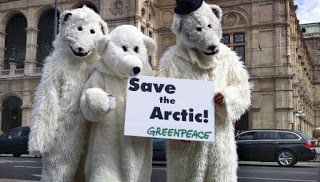 Not so much the Arctic - more the World!
Not so much the Arctic - more the World!

I'm doing this because I'm increasingly concerned that the issue of climate change is going to be overshadowed by the Syrian crisis and discussion of whether or not we should bomb the hell out of various middle eastern locations. The climate issue is of the utmost importance - being the catalyst for conflict all over the world and the biggest threat to our national security. Most of the so-called 'economic migrants' from African countries are leaving because they are being starved out by extreme weather events and brutally treated by armed militias who take advantage of the fragile situation to create conflict so that they can seize 'power'. There's always money for guns. Southern Africa is experiencing a particularly bad drought at the moment - and in the north, Somalia, Ethiopia, Sudan and Eritrea are being badly affected by climate events. Poor countries (often with corrupt regimes) don't have the resources to cope with the displacement and need that climate catastrophe creates.
In Syria, climate change was the flash point for the uprising against Assad, where severe drought caused mass migration from farms to the cities. Among the homeless and jobless, protests against the government began to escalate and disaffected people were fertile ground for recruitment to what we now regard in blanket terms as 'terrorist' groups. Not all the groups fighting against Assad are Daesh - it's very complicated.
So climate change leads to conflict over scarce resources and the mass migration of hungry people. You can't bomb your way out of this. Scientists tell us that this year we pass the red danger line of 400 mgms of carbon dioxide in the atmosphere and that global warming (the average) is already heading for 2 degrees (already passed in some places). So the refugee crisis we're seeing from the Middle East and Africa is only a fraction of the displacement we are likely to see in the next decade. Does that scare you? It does me. But there is still time to act. I want the government to know that I care, passionately about the future of my children and grandchildren.
That's why I'll be standing on a street in London on Sunday morning with my placard, in the rain, just one small person trying to stand up for what I believe in.
 Not so much the Arctic - more the World!
Not so much the Arctic - more the World!
Published on November 27, 2015 11:06
November 23, 2015
Tuesday Poem: Democracy by Dorianne Laux
With thanks to Jo Bell for sharing this poem, which I hadn't read before.
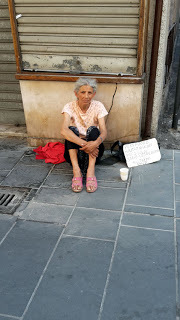 Refugee, Italy 2015When you’re cold—November, the streets icy and everyone you pass
Refugee, Italy 2015When you’re cold—November, the streets icy and everyone you pass
homeless, Goodwill coats and Hefty bags torn up to make ponchos—
someone is always at the pay phone, hunched over the receiver
spewing winter’s germs, swollen lipped, face chapped, making the last
tired connection of the day. You keep walking to keep the cold
at bay, too cold to wait for the bus, too depressing the thought
of entering that blue light, the chilled eyes watching you decide
which seat to take: the man with one leg, his crutches bumping
the smudged window glass, the woman with her purse clutched
to her breasts like a dead child, the boy, pimpled, morose, his head
shorn, a swastika carved into the stubble, staring you down.
So you walk into the cold you know: the wind, indifferent blade,
familiar, the gold leaves heaped along the gutters. You have
a home, a house with gas heat, a toilet that flushes. You have
a credit card, cash. You could take a taxi if one would show up.
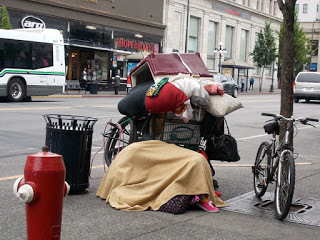 Homeless girl, Victoria, British ColumbiaYou can feel it now: why people become Republicans: Get that dog
Homeless girl, Victoria, British ColumbiaYou can feel it now: why people become Republicans: Get that dog
off the street. Remove that spit and graffiti. Arrest those people huddled
on the steps of the church. If it weren’t for them you could believe in god,
in freedom, the bus would appear and open its doors, the driver dressed
in his tan uniform, pants legs creased, dapper hat: Hello Miss, watch
your step now. But you’re not a Republican. You’re only tired, hungry,
you want out of the cold. So you give up, walk back, step into line behind
the grubby vet who hides a bag of wine under his pea coat, holds out
his grimy 85 cents, takes each step slow as he pleases, releases his coins
into the box and waits as they chink down the chute, stakes out a seat
in the back and eases his body into the stained vinyl to dream
as the chips of shrapnel in his knee warm up and his good leg
flops into the aisle. And you’ll doze off, too, in a while, next to the girl
who can’t sit still, who listens to her Walkman and taps her boots
to a rhythm you can’t hear, but you can see it—when she bops
her head and her hands do a jive in the air—you can feel it
as the bus rolls on, stopping at each red light in a long wheeze,
jerking and idling, rumbling up and lurching off again.
Dorianne Laux, “Democracy” from Facts About The Moon. Copyright © 2007 by Dorianne Laux. With thanks to the Poetry Foundation
TheTuesday Poets are an international group, based in New Zealand, who try to post a poem every Tuesday and take it in turns to edit the hub. If you'd like to see what the others are posting, please click on this link.
 Refugee, Italy 2015When you’re cold—November, the streets icy and everyone you pass
Refugee, Italy 2015When you’re cold—November, the streets icy and everyone you passhomeless, Goodwill coats and Hefty bags torn up to make ponchos—
someone is always at the pay phone, hunched over the receiver
spewing winter’s germs, swollen lipped, face chapped, making the last
tired connection of the day. You keep walking to keep the cold
at bay, too cold to wait for the bus, too depressing the thought
of entering that blue light, the chilled eyes watching you decide
which seat to take: the man with one leg, his crutches bumping
the smudged window glass, the woman with her purse clutched
to her breasts like a dead child, the boy, pimpled, morose, his head
shorn, a swastika carved into the stubble, staring you down.
So you walk into the cold you know: the wind, indifferent blade,
familiar, the gold leaves heaped along the gutters. You have
a home, a house with gas heat, a toilet that flushes. You have
a credit card, cash. You could take a taxi if one would show up.
 Homeless girl, Victoria, British ColumbiaYou can feel it now: why people become Republicans: Get that dog
Homeless girl, Victoria, British ColumbiaYou can feel it now: why people become Republicans: Get that dogoff the street. Remove that spit and graffiti. Arrest those people huddled
on the steps of the church. If it weren’t for them you could believe in god,
in freedom, the bus would appear and open its doors, the driver dressed
in his tan uniform, pants legs creased, dapper hat: Hello Miss, watch
your step now. But you’re not a Republican. You’re only tired, hungry,
you want out of the cold. So you give up, walk back, step into line behind
the grubby vet who hides a bag of wine under his pea coat, holds out
his grimy 85 cents, takes each step slow as he pleases, releases his coins
into the box and waits as they chink down the chute, stakes out a seat
in the back and eases his body into the stained vinyl to dream
as the chips of shrapnel in his knee warm up and his good leg
flops into the aisle. And you’ll doze off, too, in a while, next to the girl
who can’t sit still, who listens to her Walkman and taps her boots
to a rhythm you can’t hear, but you can see it—when she bops
her head and her hands do a jive in the air—you can feel it
as the bus rolls on, stopping at each red light in a long wheeze,
jerking and idling, rumbling up and lurching off again.
Dorianne Laux, “Democracy” from Facts About The Moon. Copyright © 2007 by Dorianne Laux. With thanks to the Poetry Foundation
TheTuesday Poets are an international group, based in New Zealand, who try to post a poem every Tuesday and take it in turns to edit the hub. If you'd like to see what the others are posting, please click on this link.
Published on November 23, 2015 13:04
November 20, 2015
The Irish Stories of Mary Costello
Running a reading group has been a revelation for me. The pressure of finding a new short story every week has taken me into areas of literature I wouldn't normally have ventured. And, without the recommendation of a friend, I wouldn't have found the wonderful Irish writer, Mary Costello.
Elizabeth Stott
, who writes short stories herself, recommended a collection called
The China Factory,
published by a small Dublin publishing house, Stinging Fly Press. It came with a blindingly good endorsement from Anne Enright in The Guardian comparing the author to Alice Munro and talking about 'the accumulation of tiny pleasures', 'a satisfying and accomplished debut', and perhaps most perceptively, 'There is a kind of immaculate suburban sadness in many of these tales'.
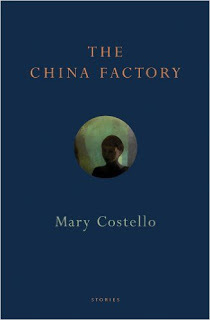
Because this is the Ireland of the Celtic Tiger, and the characters, still rooted in an older culture, are still inhibited by old customs and moralities, unsure of their identities, like battery chickens stepping out of the open cage for the first time. The events of the stories are the stuff of ordinary lives - a girl about to leave for college, taking a summer job in a china factory; the death of a child that breaks a marriage; a man in an unfulfilled relationship who builds a fantasy around a woman he once met; a girl who gives up her child for adoption.
This is Irish writing - easy dialogue that always says more than the words on the page, prose rich with images, every sentence poised musically against the others. It has left me wanting to read more work by this writer (she has a debut novel, Academy Street ) and also asking the question, what is it about the Irish that makes them so good with words?
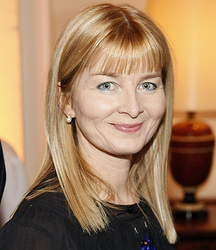 In
an interview
for the Irish Arts Council, Mary Costello talks about writing the stories that make up this collection. She speaks with a characteristic humility.
In
an interview
for the Irish Arts Council, Mary Costello talks about writing the stories that make up this collection. She speaks with a characteristic humility.
"The greatest challenge with writing in general was - and is - self-doubt. For years I doubted that I had anything worth saying or any story worth telling, and even if I did, who would want to read it! I think this is a common enough anxiety in writers. And when you think about it, it’s not surprising, because it is absurd to think that anyone would want to read the stuff that rattles around inside our heads. Who do we think we are anyway? And what a cheek to expect complete strangers to invest time and money in reading our random imaginings. And yet we do it. Something in us needs to be heard . ."
She works hard and I was interested to find that she thinks 'voice' and 'tone' are the most important elements in a short story.
"The first draft is tough. Finding the right voice and tone is crucial. You have to be patient. You have an image of how the story should be, how the voice should sound, but of course the effort to execute these falls way short. So you keep at it and maybe something starts to show itself. Occasionally, you’re lucky and you hit on the voice early on, and things are a small bit easier then."
Mary admits that her primary influences are Alice Munro and J.M. Coetzee. Her advice to new authors was once given to her: "Write with your heart and don’t be afraid to bleed."

Because this is the Ireland of the Celtic Tiger, and the characters, still rooted in an older culture, are still inhibited by old customs and moralities, unsure of their identities, like battery chickens stepping out of the open cage for the first time. The events of the stories are the stuff of ordinary lives - a girl about to leave for college, taking a summer job in a china factory; the death of a child that breaks a marriage; a man in an unfulfilled relationship who builds a fantasy around a woman he once met; a girl who gives up her child for adoption.
This is Irish writing - easy dialogue that always says more than the words on the page, prose rich with images, every sentence poised musically against the others. It has left me wanting to read more work by this writer (she has a debut novel, Academy Street ) and also asking the question, what is it about the Irish that makes them so good with words?
 In
an interview
for the Irish Arts Council, Mary Costello talks about writing the stories that make up this collection. She speaks with a characteristic humility.
In
an interview
for the Irish Arts Council, Mary Costello talks about writing the stories that make up this collection. She speaks with a characteristic humility."The greatest challenge with writing in general was - and is - self-doubt. For years I doubted that I had anything worth saying or any story worth telling, and even if I did, who would want to read it! I think this is a common enough anxiety in writers. And when you think about it, it’s not surprising, because it is absurd to think that anyone would want to read the stuff that rattles around inside our heads. Who do we think we are anyway? And what a cheek to expect complete strangers to invest time and money in reading our random imaginings. And yet we do it. Something in us needs to be heard . ."
She works hard and I was interested to find that she thinks 'voice' and 'tone' are the most important elements in a short story.
"The first draft is tough. Finding the right voice and tone is crucial. You have to be patient. You have an image of how the story should be, how the voice should sound, but of course the effort to execute these falls way short. So you keep at it and maybe something starts to show itself. Occasionally, you’re lucky and you hit on the voice early on, and things are a small bit easier then."
Mary admits that her primary influences are Alice Munro and J.M. Coetzee. Her advice to new authors was once given to her: "Write with your heart and don’t be afraid to bleed."
Published on November 20, 2015 09:13
November 17, 2015
Tuesday Poem - Ewan MacColl 'Moving On'.
'You better get born in some place else,
Move along, getalong, move, shift - Go!'
This is the ultimate song about social prejudice, racism and unwanted people - as applicable to refugees as it was to travellers - written by Ewan MacColl, sung here by the MacColl brothers, Chris Wood and beautiful descant by Karine Polwart.
The Tuesday Poets are an international group who try to post something poetry related every Tuesday and take it in turns to edit the main 'hub'. If you'd like to see what the others are up to, please click on this link.
Move along, getalong, move, shift - Go!'
This is the ultimate song about social prejudice, racism and unwanted people - as applicable to refugees as it was to travellers - written by Ewan MacColl, sung here by the MacColl brothers, Chris Wood and beautiful descant by Karine Polwart.
The Tuesday Poets are an international group who try to post something poetry related every Tuesday and take it in turns to edit the main 'hub'. If you'd like to see what the others are up to, please click on this link.
Published on November 17, 2015 02:33
November 9, 2015
Remembrance Day Tuesday Poem: Here Bullet by Brian Turner
HERE, BULLET
If a body is what you want,
then here is bone and gristle and flesh.
Here is the clavicle-snapped wish,
the aorta’s opened valves, the leap
thought makes at the synaptic gap.
Here is the adrenaline rush you crave,
that inexorable flight, that insane puncture
into heat and blood. And I dare you to finish
what you’ve started. Because here, Bullet,
here is where I complete the word you bring
hissing through the air, here is where I moan
the barrel’s cold esophagus, triggering
my tongue’s explosives for the rifling I have
inside of me, each twist of the round
spun deeper, because here, Bullet,
here is where the world ends, every time.
© 2005, Brian Turner
From: Here, Bullet
Publisher: Alice James Books, Farmington, ME, 2005
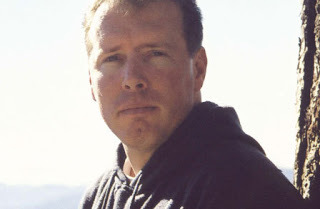
The collection Here Bullet chronicles Brian Turner's time as a serving soldier in the US army in Iraq. It records the realities of war rather than philosophical musings about the rights and wrongs of armed conflict and the poem aren't sanitized for the squeamish reader. If we allow our governments to wage war and fund our armed forces to fight then we need to know what we are sending them into.
The wonderful thing about the poems in this collection is the way the poems engage with traditional Arabic poetry - its themes and forms. There are two other collections, Phantom Noise (which deals with post-traumatic stress) and My Life as a Foreign Country.
For more about Brian Turner and his poetry click here.
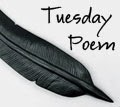 The Tuesday Poets are an international group, based in New Zealand, who aim to post a poem every Tuesday and take it in turns to edit the main website. If you'd like to see what we're all posting this week please click here to go to the Hub.
The Tuesday Poets are an international group, based in New Zealand, who aim to post a poem every Tuesday and take it in turns to edit the main website. If you'd like to see what we're all posting this week please click here to go to the Hub.
If a body is what you want,
then here is bone and gristle and flesh.
Here is the clavicle-snapped wish,
the aorta’s opened valves, the leap
thought makes at the synaptic gap.
Here is the adrenaline rush you crave,
that inexorable flight, that insane puncture
into heat and blood. And I dare you to finish
what you’ve started. Because here, Bullet,
here is where I complete the word you bring
hissing through the air, here is where I moan
the barrel’s cold esophagus, triggering
my tongue’s explosives for the rifling I have
inside of me, each twist of the round
spun deeper, because here, Bullet,
here is where the world ends, every time.
© 2005, Brian Turner
From: Here, Bullet
Publisher: Alice James Books, Farmington, ME, 2005

The collection Here Bullet chronicles Brian Turner's time as a serving soldier in the US army in Iraq. It records the realities of war rather than philosophical musings about the rights and wrongs of armed conflict and the poem aren't sanitized for the squeamish reader. If we allow our governments to wage war and fund our armed forces to fight then we need to know what we are sending them into.
The wonderful thing about the poems in this collection is the way the poems engage with traditional Arabic poetry - its themes and forms. There are two other collections, Phantom Noise (which deals with post-traumatic stress) and My Life as a Foreign Country.
For more about Brian Turner and his poetry click here.
 The Tuesday Poets are an international group, based in New Zealand, who aim to post a poem every Tuesday and take it in turns to edit the main website. If you'd like to see what we're all posting this week please click here to go to the Hub.
The Tuesday Poets are an international group, based in New Zealand, who aim to post a poem every Tuesday and take it in turns to edit the main website. If you'd like to see what we're all posting this week please click here to go to the Hub.
Published on November 09, 2015 15:30



